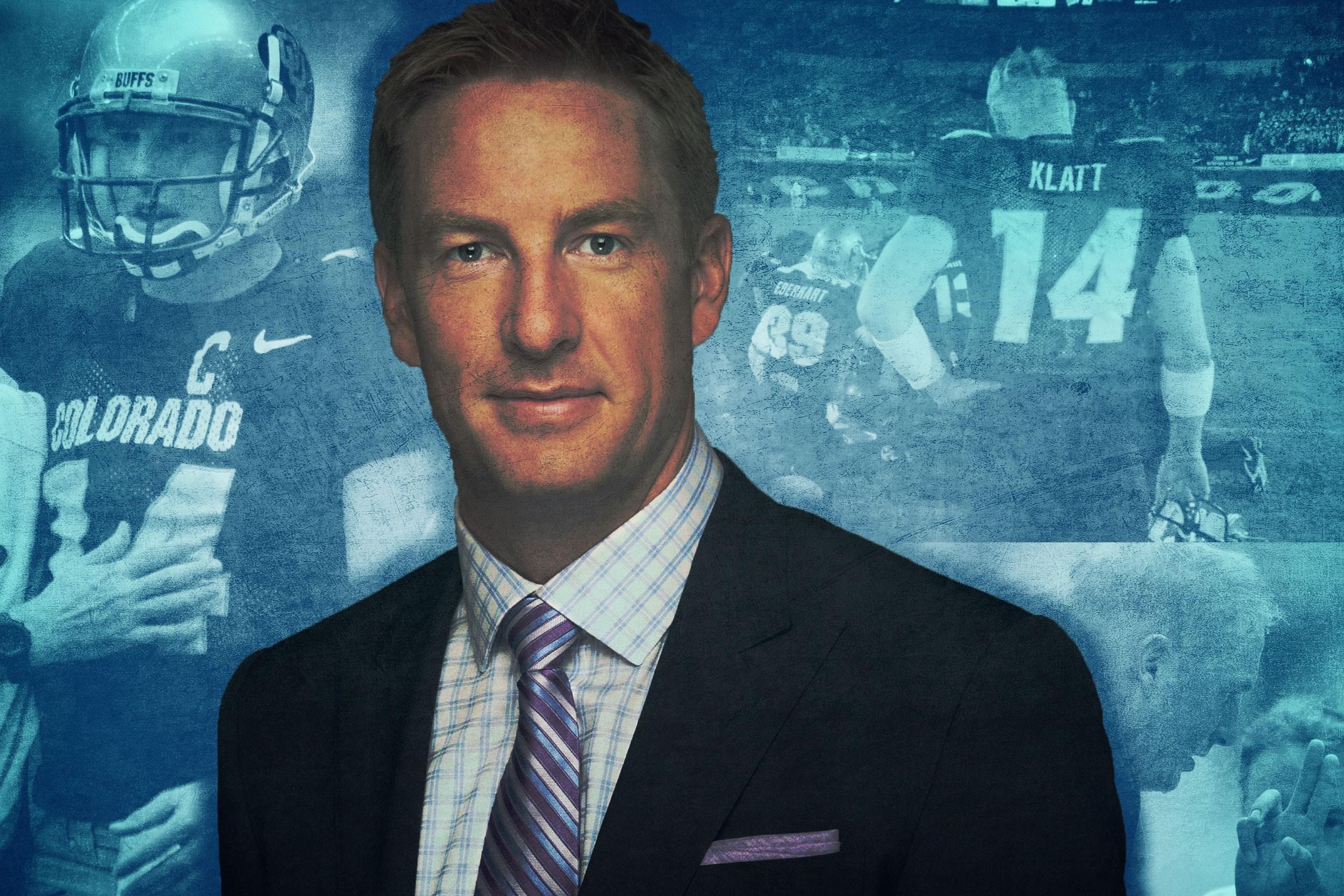Who Is Joel Klatt?
He lived with alcoholism. He suffered 10 concussions at Colorado. And now he’s one of the best announcers in college football.College football announcing booths are like shadow versions of the All-America team. Kirk Herbstreit and Gary Danielson are more famous for talking about football than they ever were for throwing one; Matt Leinart, meanwhile, does the studio show. This isn’t accidental. Herbstreit has said that he prepared so ferociously early in his career because he was relatively anonymous — as they say, he had everything to prove.
So it went for Joel Klatt, who was a "cerebral quarterback" (his air quotes) at Colorado who never sniffed the Heisman. But now, through the elevating power of TV, Klatt is the no. 1 college football guy at Fox. When Oklahoma played Ohio State last week, Klatt got the call with Gus Johnson. Fox and FS1 will begin airing Big Ten games next year, and Klatt figures to someday call Michigan–Ohio State.
Klatt, who is 34, has enough awareness of the granular details of the game and the fan message boards that he can get away with the hot-ish take. Bob Sturm, who hosts a Dallas radio show that Klatt appears on, told me: "He handles the stuff I’m into — the tactics and X’s and O’s and strategy — like a really smart football guy. Then he handles the topics of the day like a sports-radio guy."
Leinart said Klatt taught him just how much an announcer has to prepare to be good on TV. "Whereas with him," Leinart said, "I’m always telling him to relax a little bit." Fox’s Rob Stone concurred: "There’s not a lot of coffee talk with Joel."
I met Klatt in Los Angeles with the idea of filling in his backstory, much like a Heisman ceremony would for a star player: the peaks, the valleys, etc. It didn’t go like that. We started with his alcoholism.

"There are several different types of alcoholism," Klatt said. "Mine was the binge variety. It wasn’t that I would have five drinks a day. I would have 15 to 20 drinks every time I drank — which was once or twice a week, on an off day or something like that. I just had no governor."
Klatt is the son of a Denver-area high school football coach. But he turned out to be a better high school baseball player than a football player. After the Padres drafted him in 2000, Klatt signed and was eventually shipped to rookie ball in Idaho Falls.
There, Klatt discovered he couldn’t hit pro pitching. In 2001, he had a meager .605 OPS. "All of a sudden, I’m having to deal with failure athletically for the first time in my life," he said. "I had no skills to handle that. I just began drinking way too much." If he was buying, his drink was Jack Daniel’s, straight.
Klatt’s minor league teammates were 18- and 19-year-olds, and only a few had fake IDs. So they’d leave the clubhouse after a game, shower and change at the hotel they lived in, and then sneak back into the clubhouse. It became their all-night bar and lounge. "This one particular night, we drank until the sun came up," Klatt said. "We were drinking Jack Daniel’s and rum. That night, we came back for the game and I was so hung over.
"I was just praying, Please, let me just sit on the bench all night," he said. "Sure enough, I was in the lineup. … I remember walking up to the plate and hearing my name announced. I thought to myself, I’m going to throw up right on the plate."
If he swung at a pitch and missed, Klatt thought, he’d puke. He figured he should either keep his bat on his shoulder or focus so intensely on the ball that he couldn’t help but make contact. Klatt wound up choosing the latter. He said he swung at four pitches that day and got four hits.
"I don’t tell this story … it wasn’t that I was functioning," he said. "It was just one of the worst experiences of my life. I had to run to first. I thought I was going to throw up when I was on first base. One of [the hits] was a double. I got to second. I turned around to center field because I was like, I’m not going to throw up facing the stands. I acted like I was dusting myself off."
When the 2001 baseball season ended, Klatt went back home to Denver. "I came home from Idaho Falls knowing in my head, I’ve got to leave baseball," he said. "I’m not happy. This is terrible."
Klatt asked a coach at the University of Colorado to name a small college where he could restart his football career. The coach surprised Klatt by asking him to walk on at Colorado. In the fall of 2002, Klatt became a freshman quarterback for coach Gary Barnett. He was 20 years old.

When you were the quarterback at CU, I asked Klatt, were you still drinking 15 whiskeys in one sitting?
"I definitely curbed it …" he said. "I think it was just out of sheer happiness. … Everybody says, ‘Ugh, football’s a grind.’ I loved it. I was like, this is unbelievable. Look what we get to do."
Nobody, including Barnett, expected Klatt to do much more than run out behind Ralphie for four years. But, at 20, Klatt had a Zen air about him — his offensive coordinator Shawn Watson said it was like he’d already cycled through the typical freshman haze, pharmacological or otherwise. By his sophomore year, Klatt was starting.
Nationally, Klatt was known more as a talking head than a QB. In 2004, a former Colorado kicker named Katie Hnida told Sports Illustrated that she’d been raped by one of her teammates in 2000; two other women reported being raped at a Colorado recruiting party and another said she was raped afterward. Barnett was suspended; the school’s AD resigned. With no one left to face a hungry media, the school told Klatt to put in an earpiece and station himself in front of a remote camera. He did interviews with Good Morning America and other national shows.
It was like getting a master’s in media studies. "I learned they’ll stop at nothing," Klatt said of the press. "I would walk out of my house and there’d be a guy hiding in the bushes. He’d have a camera or shout a question at me. I just felt like it was a big trap all the time."
Klatt could be a sharp critic, too. When he was still playing, he wrote a Sports Illustrated essay noting how miserably the city of Boulder treated Colorado’s black athletes. "Boulder’s a place that really loves itself …" he told me. "They’re not tolerant at all."
Klatt helped Colorado win Big 12 North titles in 2004 and 2005. But he got pounded. During the three years he was the starting quarterback, he said he suffered 10 concussions. In the days before concussion protocols, most weren’t formally diagnosed. Klatt simply told coaches he was fine and kept playing.
"I am absolutely of the old-school variety — partly because my dad was a Marine — that you don’t pull me off the field," Klatt said. "If I’m going to get up, I’m going to compete. That was always my mind-set. My own stupidity and pride kept me out there."
What did your concussions feel like? I asked.
"Everybody’s is different," Klatt said. "For me … it would sound like a collision. You know when you hear something loud and it almost deafens you for a second?"
While he was lying on the ground unable to hear, Klatt experienced a visual "deafening," too. As he sat across from me, he held a fist up to each eye and then splayed his fingers out to show how darkness consumed his field of vision. "Bam!" he said. "It’s just, like, black."
In 2005, Klatt’s senior year, Colorado played Texas in the Big 12 championship game. Colorado was a pretty mediocre team; Texas was on a glide path to the national title. Texas was up 70–3 in the third quarter when a linebacker blitzed from Klatt’s left and put his helmet into Klatt’s jaw.
Klatt has no memory of the immediate aftermath: of doctors coming out to the field, of trying to get up on his own. The first thing he remembers is waking up in a hospital hours later and seeing a doctor wearing a white coat with a Longhorns logo stitched on it. Klatt thought he was having a bad dream.
A few days later, Klatt was back in Boulder taking a final exam. He stared at the first page of the test. "All the lines began to wave," he said. "I couldn’t read it. I started getting dizzy, started sweating. I just took it up to my professor. I said, ‘Is there anyway you could tell me what my grade would be if I just took a zero on this?’
"He said, ‘I think it would be about a C.’
"I said, ‘So I’ll pass?’
"He said, ‘Yeah.’
"I just handed in the blank test and walked out. I took a C-minus on my GPA for that class because I couldn’t take the final." Team doctors said that this, his 10th concussion, would keep him from playing in the bowl game. Klatt never took another snap at Colorado.

Klatt’s head still tingles with the effects of his concussions. "I’m actually right now having an effect of it," he told me. A few minutes before we talked, he’d been sitting in the sun, addressing a group of employees from Fox Sports’ programming and research departments. Anytime Klatt is in the sun for more than 20 minutes without sunglasses, he gets a headache.
Along with Troy Aikman, Klatt is part of the first generation of players to both suffer concussions and call football in the age of CTE. It presents an interesting challenge: A chunk of Klatt’s audience not only has a lot of information about concussions (from Alan Schwarz, the Fainaru brothers, and the Will Smith movie) but is repulsed by the sight of head trauma. They see Cam Newton’s helmet get piñata’d around and think, "We’ve got to get these hits out of the game!"
I asked Klatt what he thinks when he sees players sustain concussions from the booth.
"I cringe …" he said. "Because I know what that was like for my wife and my family." (Klatt began dating his wife, Sara, when they were students at Colorado.)
He continued, "But then, at the same time, I think to myself, That’s still a part of the game. I was under no assumption that the game was totally safe when I played."
It’s not that Klatt and other football commentators are insensitive. What’s different about them — and what’s jarring for those of us watching on TV — is that they lack our reflexive reaction. "Some people are like, ‘Oh, that should be a penalty!’" Klatt said. "Or: ‘How do we get this out of the game?’ To me, that’s part of the game. I have a much more visceral reaction when I see a player ejected for targeting" — a penalty that began warranting an automatic dismissal in the NCAA in 2013.
"I believe quarterbacks now make more dangerous throws than ever before because they have no consequence when their wide receiver gets blown up," Klatt said. "The villain has gone from the quarterback in the old days — ‘He hung ’em out to dry!’ is how we used to say it — to the defensive player — ‘He targeted!’ It’s a shift based on the powers that be trying to cover their own ass in the court of law."
He added, "The NFL guys are the worst. … They put their wide receivers in the most precarious situations in the history of the game because they can. And no one comments on it anymore because it’s all the defenders’ responsibility. It’s wrong. It’s totally wrong."
Concussions undercut any shot Klatt had at an NFL career. His invite to the combine was yanked; he went to training camp with the Lions but didn’t make the team. In 2006, Klatt returned to Denver and was overwhelmed by the sensation he felt when he was in rookie ball: that he had failed.

"My identity was at that point completely wrapped up in being an athlete and being successful — being the quarterback," Klatt said. "It was gone. I was lost."
Klatt began drinking as heavily as he had in Idaho Falls. "This time, though, I was married," he said. "So I had to hide it even more." He and Sara would share a bottle of wine at dinner. When Sara went to the bathroom, Klatt would gulp down all the wine in his glass and then refill it to its previous level. When Sara went to bed, Klatt would polish off the rest of the bottle. "It was almost like this cat-and-mouse game," he said.
When Joel and Sara went out to dinner with friends, Klatt could see his wife get nervous as soon as he ordered a second drink.
Klatt got his start as a broadcaster during this period, when a regional cable station asked him to be a fill-in color man on a high school game. He did well and was asked back. Later, Klatt was hosting morning-drive sports radio in Denver and Rockies pre- and postgame shows.
What was the event that made you quit drinking? I asked.
"The event?" Klatt said with a rueful smile. "My wife was working in pharmaceutical sales. She was putting on a dinner for doctors. … She was like, ‘Just figure out dinner on your own.’
"I went to Fleming’s Steakhouse because I knew they had this incredible burger for happy hour at the bar. … I was alone. I wasn’t meeting anyone there. I was just going to stop and get the burger. … Then I saw someone order a martini. I was like, ‘That looks delicious.’ So I ordered a martini.
"I walked out with a $180 bill, alone, at happy hour," Klatt said. "I drove myself home at 7 p.m. I don’t know how many [martinis] I had, to be honest with you." He thinks maybe 15 or 20.
"I get home," Klatt said. "Now, it’s like 8:30. Sara gets home from her dinner, walks in. I look at her and she just stops. Stone dead. She’s looking at me. She could tell. I didn’t have to say a word."
"She was pregnant at the time with our oldest kid, Henry. She told me, ‘You’re done or else.’"
That was in 2011. Klatt drank a glass of merlot the next month, on Labor Day. He said he hasn’t had a drink in the five years since. Neither has Sara, who quit out of solidarity.
"I did individual counseling," Klatt said. "That’s where I dealt with a lot of those issues. I didn’t realize at that point that my family was a sweep-it-under-the-rug family or that we had a lineage of alcoholism." He threw himself into his nondenominational church. He’d grown up Baptist but said the culture of his church made him squeamish.
"So the effects, right?" Klatt said. "Oh, man, there are so many. I’m certainly happier now because I feel more present. I don’t have a vice where I go to escape, whether it’s depression or pain. It also creates some more anxiety, because there aren’t escapes for me."
Klatt joined FS1 when the network was created in 2013. He talked his way from a studio job into the booth. "He doesn’t have the big platform pushing him like Kirk Herbstreit does," said Rob Stone. "But I’d love to see Herbie and Klatt go toe-to-toe. It’d be a good fight."
At Fox, Klatt discovered something Herbstreit and Danielson discovered before him. Announcing might offer a path to make up for a sub-Heisman playing career. But being a great announcer requires a sublimation of oneself that’s no less demanding than the one that college football requires.
Klatt has stopped drinking alcohol. He can deal with the aftermath of his concussions. But he’s still figuring out how to keep his identity from getting swallowed up by being the quarterback of the booth. "I thrive on those highs and successes and performing," he said. "I’m like, Man, this is probably way too similar to playing for me to be really healthy. I know that in the back of my mind. But I do love what I do."


